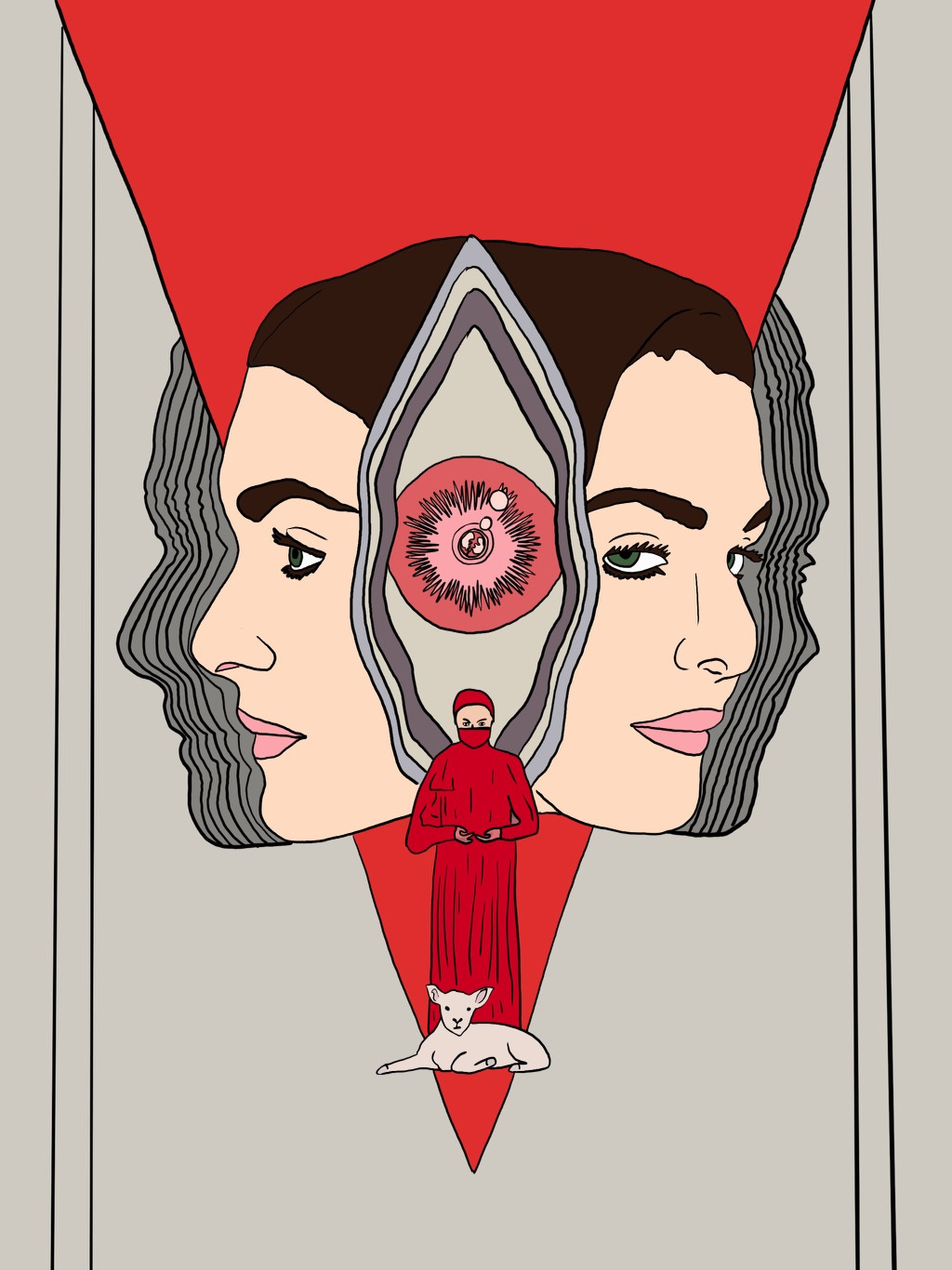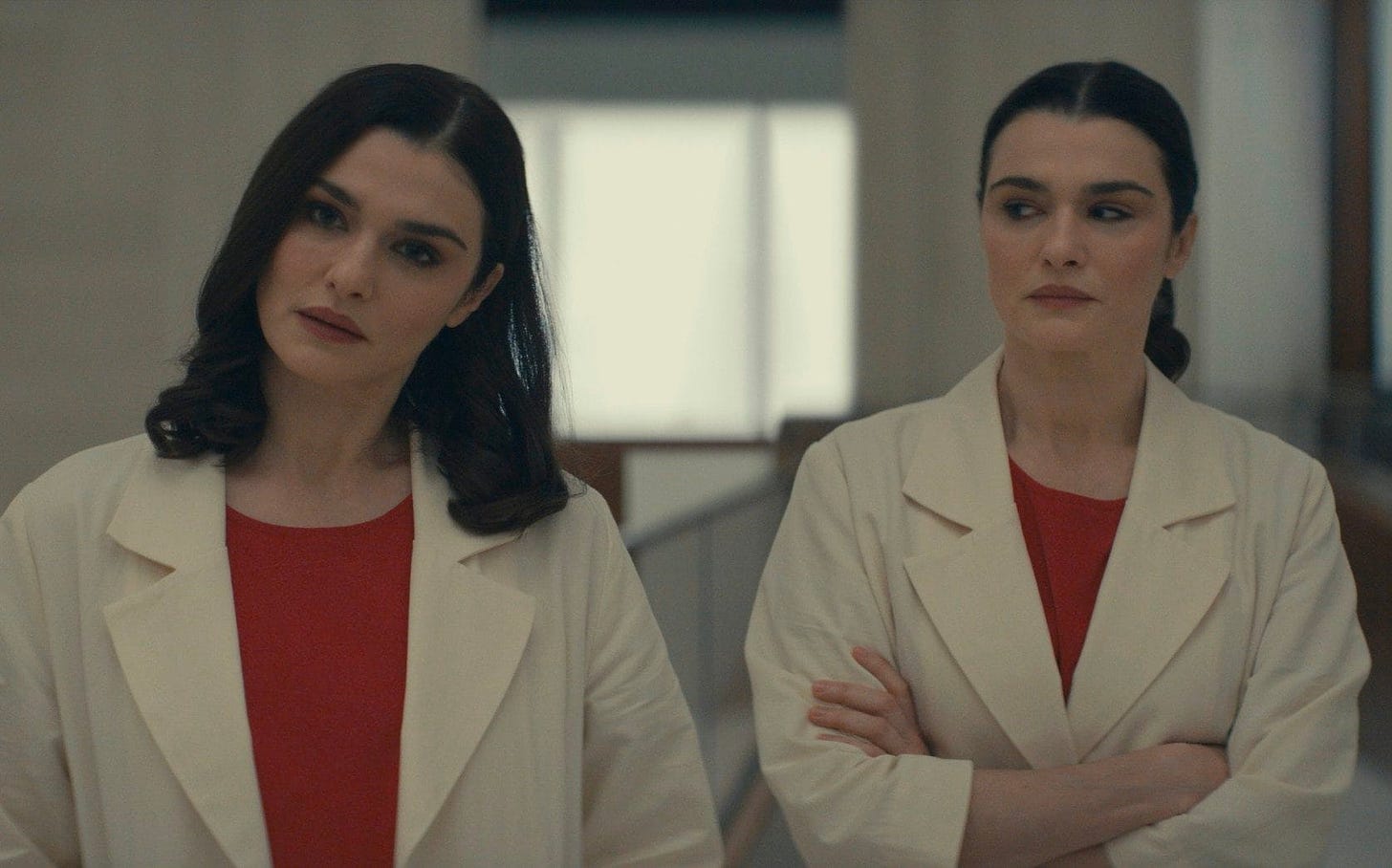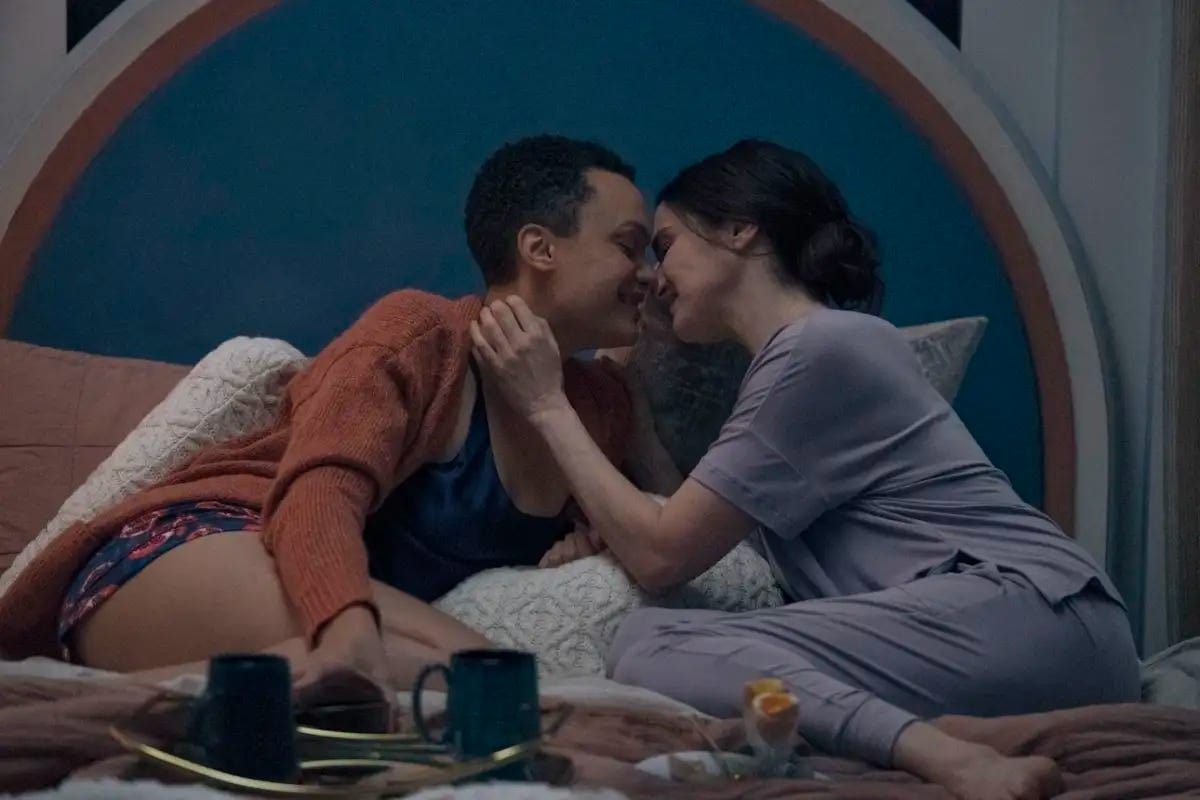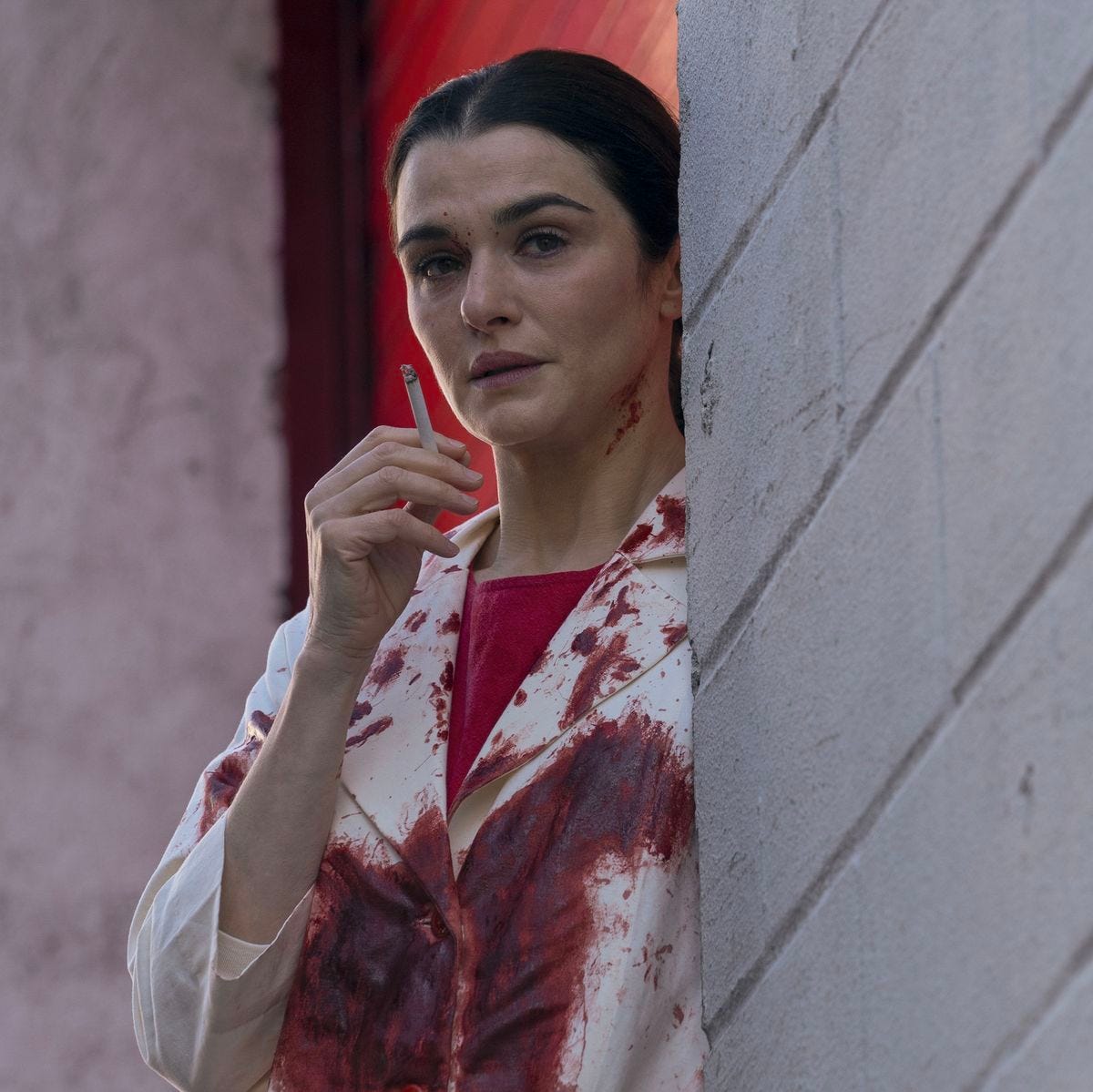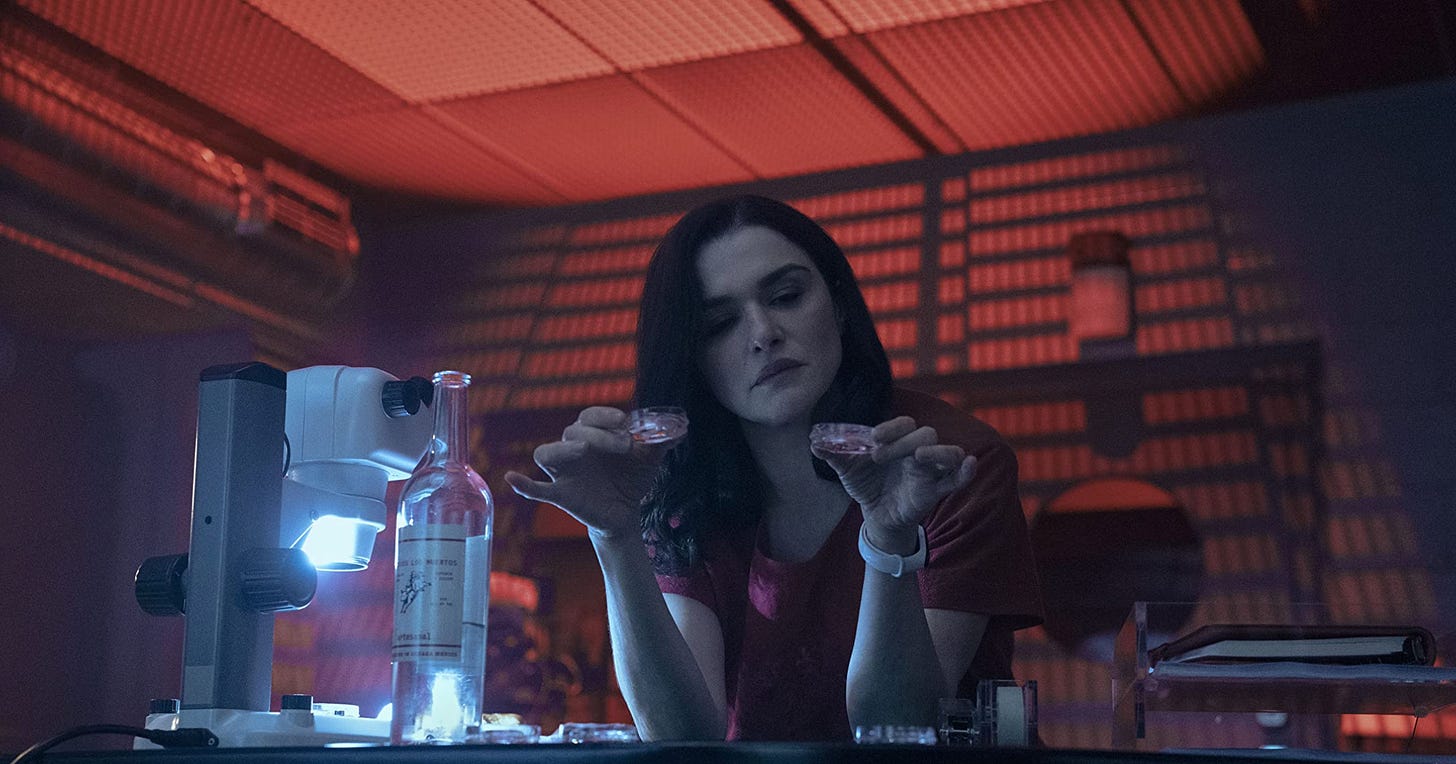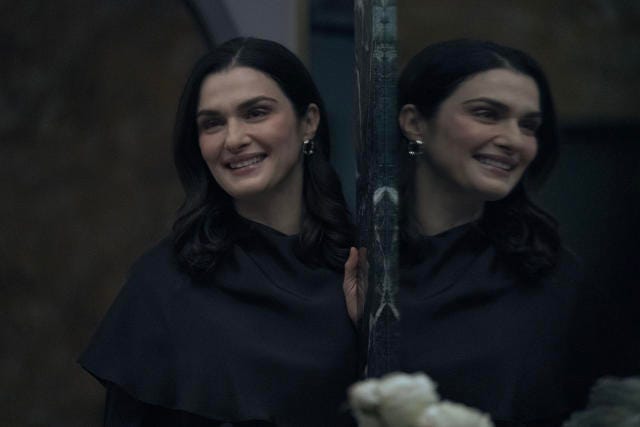Review: I Have to Climb Inside You Now
The psychosexual, Freudian paradise of Amazon Prime's 'Dead Ringers'
The Yearning Rating: ✰✰✰½
Romance ✰✰✰
Sex ✰✰✰✰
Storytelling ✰✰½
Performance ✰✰✰✰½
Yearning ✰✰✰✰½
Spoilers ahead for Amazon Prime’s Dead Ringers and a trigger warning for discussion of pregnancy loss and some graphic content.
Written by Meg Heim
I love the horror concept of the other. A mirror of you, somewhere, lurking in the shadows. Waiting to take what you have. Your freedom, your lover, your…life?1 Those stories become about fighting to keep what is yours, while someone else, just like you in every way (except evil), is constantly on your tail.
I think this premise can be so successful because of that twinge of narcissistic fascination we all have within ourselves—the part that can’t help wondering, what would it be like if there was someone else in the world who was almost exactly like you? It might afford you the opportunity to actually “look in the mirror”, the real life version of that TikTok filter that's supposed to shock and horrify you show you how everyone else sees you. Maybe it would give you an unimaginable sense of community, safety and reassurance. Or maybe you would resent the loss of your singularity in this world. If you had the chance to look, would you like what you saw?
Of course, there are some people in the world who do have that opportunity. According to the NHS, 3 out of every 1,000 births are identical twins. These are people who entered this world together, cells that started as one but eventually became two. If you aren’t a twin, that kind of connection with another human being is unfathomable.
I wish this was the part of the review where I reveal I’m a twin. I sincerely hope that there is an identical twin out there somewhere, writing a review of Amazon Prime’s Dead Ringers. But alas. I can only humbly offer up my Bachelors in Psychology and a deep passion for Rachel Weisz’s career and hope that that is enough for you people. Dead Ringers is a reboot of David Cronenberg’s 1988 movie of the same name. Both the original and the 2023 reboot are based on the book Twins by Bari Wood. See here for a good take on why we aren’t allowed to make TV anymore without preexisting intellectual property (IP).
Dead Ringers stars Rachel Weisz and Rachel Weisz as Elliot and Beverly Mantle, two talented, queer, and extremely codependent identical twin gynecologists who work at the same hospital and regularly “cover for each other” professionally, romantically and otherwise. At first glance, the two represent a familiar dichotomy—Elliot is the hypersexual, uninhibited twin who prefers the endless opportunity of the research lab and frequently does lines of coke off of literally every surface. Beverly is the restrained and timid lesbian who is much more ethical, awkward, and patient facing. One “good” twin, one “bad” one!
Beverly is trying to get pregnant. And in the irony of all ironies, as one of the most preeminent New York gynecologists, she is not having any luck. In the first episode, with very little emotion, she miscarries in her apartment bathroom. She fishes the clump of tissue out of the toilet and, gently holding it in the palm of her hand, greets it. Elliot, as the provider of Beverly’s IVF care, is not discouraged by yet another miscarriage in the slightest. In fact, she’s almost…excited. There is a long, slow shot where Elliot inserts a sizable ultrasound wand into Beverly to confirm the miscarriage via a pelvic ultrasound. It’s positively penetrative. Anyway—alongside Beverly’s private fertility journey, the Mantle twins are attempting to secure a massive amount of funding from evil lesbian faux-Sackler-family philanthropist Rebecca Parker (played by the magnificently cunty Jennifer Ehle) to open their own state of the art, ultra modern birthing center.
This show is deliciously dark and sordid. And when I say dark, I mean…it is literally dark. The lighting is so dim in half of these damn scenes that I was squinting at the screen. But it certainly gets the point across—there is an austere grimness that permeates every aspect of the Mantle twins’ lives. Their days are filled with the bloody reality of childbirth, their shared apartment is cold and stark. Their assistant/cook/driver Greta is so chic and creepy. When Elliot realizes Beverly is attracted to the queer starlet-turned-patient Genevieve (Britne Oldford), she offers to “get her” for Beverly, as she does sometimes for the shyer twin. One successful seduction later, Beverly jumps at the opportunity to carry things further. That night, Elliot crawls across their kitchen counter, breathing in Genevieve’s discarded underwear2 and shoving random leftovers into her mouth as her sister gets it on in the other room. As Beverly and Genevieve’s steamy one night stand begins to turn into more, Elliot is incensed that Beverly will neither share nor abandon her new love interest. “You haven’t had her until we’ve both had her,” Elliot whispers into Beverly's ear. Sister, lover, parasite.
Weisz is the engine of this show. Her performances as Beverly and Elliot are outstanding; not only are they entirely distinct and recognizable, they are positively charged with creepiness and psychosexual energy. (Freud deserves a producer credit on this one.) If you have a hard time clarifying which twin is which, you can always default to their hairstyle for confirmation—Beverly’s is tied back in a tidy bun befitting of her ironclad morals, whereas Elliot’s is worn down, free flowing and slightly more wild. In a very twin-centric show, why not cast actual twins? I think this is to honor the original Dead Ringers, in which Jeremy Irons played both Beverly and Elliot Mantle (and, FWIW was not nearly as easy to tell apart3). Also, as Rachel Handler so aptly describes it in this amazing Rachel Weisz Gay Index, is anyone really suited to top Rachel Weisz other than Rachel Weisz?
Baby gays in the throes of their first queer love affairs often remark on how comfortable everything is with their new lovers. Almost like there are no rules about what can be shared, and (if applicable) it's a relief to not have to dance around the discomfort of your period. To me, queerness goes hand-in-hand with the instinctive knowledge that, whatever kind-of-gross reality about your body that you will eventually have to share, there will be emotional safety waiting for you on the other side. No matter how much of a “cool girl” you are, your body is still—in its own, unforgiving way—just a body. The beating sapphic heart of Dead Ringers is embroiled in this kind of radical intimacy and also takes it about 45 steps further. The Mantles walk the line of twincest so effectively because their medical degrees mean they don’t blink twice at (clinically) diving into each other's hoohas. They are frequently spattered in blood in the most artful, sapphic, hot-doctor way.
The new birthing center is modern and cavernous, with smooth, sweeping curved walls and starkly brutal red accents. (Red scrubs, red masks, red surgical cloths covering exposed bellies about to be sliced into for C sections…yeah). The opening of the Mantle-Parker Birthing Center introduces new layers to this dark tale. Beverly’s compass remains making pregnancy and childbirth a holistic and safe experience for women, but Elliot has more Frankenstinian interests. With the center now open, Elliot finally gains access to a privately funded lab where she can run questionable experiments, including illegally growing embryos far past the 14 day maximum. I personally love this part of science-y horror—the underbelly of the dimly lit lab, the reveal of the specimen. Dead Ringers captures this in a beautiful and eerie way—the red lights aglow on microscope magnifications and antiquated operating theaters. Creepy, creepy, creepy 😈
While watching Dead Ringers, that scene from My Big Fat Greek Wedding where Aunt Voula reveals her parasitic twin came unbidden into my mind.
“All my life, I had a lump at the back of my neck, right here. Always a lump…So I go to the doctor, and he did the ‘bobopsy’. Inside the lump, he found teeth and a spinal cord. Yes. Inside the lump was my twin.”
While Beverly and Elliot had the good fortune of both being fully formed, watching the constant push and pull of their relationship made me realize how consumptive it is. If one thrives, the other dwindles. Elliot craves access to Beverly so badly that it's almost like she wants to consume her. (This is supported by the open mouthed neck sucking that happens between them during a ‘sisterly embrace’…) The codependency is so potent that it thrums in the room alongside them, completely alive, almost like a third sister. Dead Ringers utilizes many mirror shots, always with just one twin. But if you see one twin in the mirror, the other is never far; often, she is actively trying to get to the other. Like they are two halves of one whole. Even when Beverly tries prioritize her new relationship and distance herself from Elliot (they spend their first night apart, ever), she begins to wither as Elliot rages. They are both beholden, in their own ways, to a chilling symbiosis between them.
Murder. Randomly going to church. Attending a bereavement group to mourn a twin that hasn’t died. Alabama. Performance art. Sadly, many of the middle plot beats of Dead Ringers felt a little convoluted and lost to me. They were harder to focus on, and the moments designed for the twins to reflect and question their realities felt a little contrived. But Weisz’ performance shines independently and as a part of the other emerging heart in the story. There is a clear through-line in this show about the complexity of navigating intimate relationships, inside your family and out. Through flashbacks we learn that the twins’ mother suffered from terrible postpartum depression, which resulted in the two of them being much closer to their father. Their mother calls over and over, leaving countless strained voicemails, longing to hear from and connect with her children. When their parents come to visit from England, Elliot even climbs into bed with them one night, wrapping her arms around her dad with her back to her mother.
I loved this show for its brutalist exploration of motherhood and its all-women's writers room who “forgot” to write men into this script. (There are seriously maybe like 5 men in the whole show). The very real longing and questioning that many face when considering parenthood is artfully heightened by the unsettling world building. Rachel Weisz is beautifully unhinged and I would definitely let her do my future IVF treatments. While some of Dead Ringers felt a little wandering to me, the series without a doubt course corrects for a brilliant finale. True to its thriller roots, the final episode provides a truly cinematic twist worth sticking around for. The twins are at the center of it, desperate to return to each other even if it is to both of their detriment. How do you know if you’re whole? And if you’re not, could you ever be happy as just one part? I will leave you with this, a sapphic calling card that Weisz was born to whisper to herself: “I have to climb inside you now”.
All episodes of Dead Ringers are streaming now on Amazon Prime.
Rachel Weisz has our heart and we hope we have yours. Please consider hitting the ♥ button on this post—that way, more readers can discover us on Substack.
Next week on The Yearning, Ali will tell us what’s she’s learned about how to blow up a pipeline with a review of Daniel Goldhaber’s How to Blow Up a Pipeline.
cc: Black Swan
Messy, messy!
Rachel Weisz supremacy





